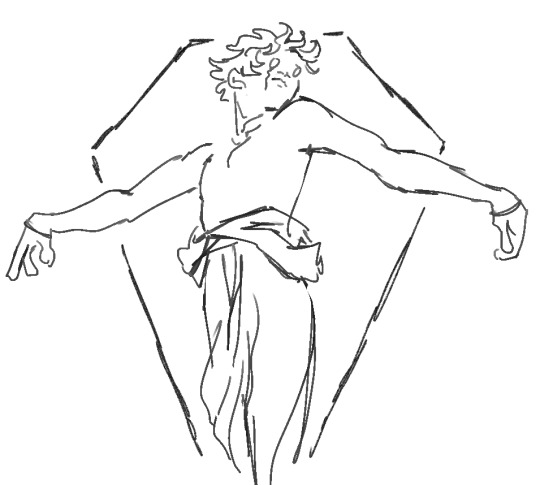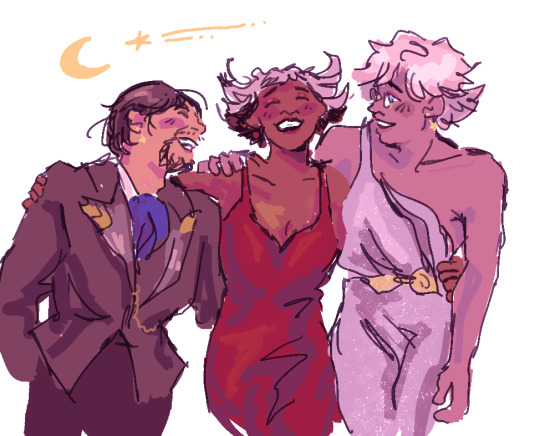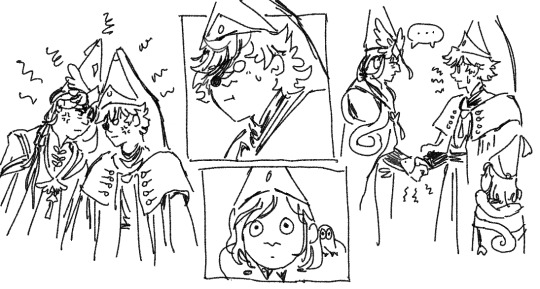#nother small post (it's not small..) meek post. mild post
Text





thingies
#witch hat tag#orufrey#nother small post (it's not small..) meek post. mild post#sensei QRTed the last one with a sweet message and made my week <3#drawn bc she randomly announced that originally qif & eas were going to be more openly hostile with each other#but she decided after feedback that qifrey would. Restrain himself now he has children in his life.#like pikachu with togepi in pikachu's vacation. She didn't say that part#just love that since i always say i see them as having this kind of autistic warfare expressed in ways other than actual fighting#since their youths. but i guess we don't know how much they had to interact as kids#i just know they're both opposite ends of Autistic Kids: one do-gooder kid who gets REALLY irked when others dont follow The Rules#and the non-verbal autistic kid who IS one push away from actually biting people#Sometimes autistic people shouldnt be friends.#anyway why did she randomly state this now of all times. Are they interacting in the next chapter. But why.#the next chapter scares me. a teaser piece of art she posted is like.....What is actually going to happen here.#What is going to happen .#anyway hope all fans of my silly drawings are doing well out there
85 notes
·
View notes
Note
Sorry if this has been addressed already but: What did it mean exactly to be "out socially"? In Northanger Abbey, Catherine goes to Bath and attends balls and social events, which I'm sure she could only do once she was out. But would Lydia and Kitty have not been allowed to the country dances until they were out? Did out have anything to do with when the skirt hem was lowered and hair put up?
It doesn’t really have anything to do with skirts or hair, no–that’s more of a Thing in Lucy Maud Montgomery’s late Victorian culture where girlhood styles in general transition into Grown Up fashions.
In Austen’s time, there were strict rules governing an unmarried girl’s entrance into society, but as people and places varied, these rules could be very relaxed (as they were in Lydia’s case, being the youngest daughter of a minor country gentleman.)
In the strictest sense, a young woman born to the right kind of gentleman or nobleman would have the right to be presented at Court in the course of the Season. (The Season is a whole ‘nother post, but it’s that annual springtime session of intensive matchmaking and merriment primarily based in London.) These genteel or noble girls would, generally around the age of seventeen, be Brought Out, that is, presented to the Queen at Court in a ceremony, and thereafter Available to Socialize. It was a signal that her education was considered complete, and that her family or guardians (and the young woman herself) would now be in a position to entertain proper offers of marriage, as well as accepting invitations to various entertainments and meetings.
This is all for city rules, of course, and even in the event that Court presentations could not be carried out (as happened in the years when King George III’s illness meant the royal family did not carry out such public functions as they usually did,) presumptions were still made that girls of the correct age and birth were to be Brought Out, which was then usually done at a formal ball, if the girl was of means to have such a function in her honour. In other cases, where money might be an object, it might just be as simple a thing as the girl’s chaperone allowing her to accept such invitations and accompany the older woman into society and be introduced ‘round to such connections as would be appropriate. Of course in a place like Longbourn and Meryton, they all know each other as neighbours, so to prevent Lydia at fifteen from attending the local assembly to dance would seem a bit silly, if she’s grown-up enough to manage the steps and enjoy herself as well as any of her sisters. (And considering Mrs. Bennet’s attitude towards wishing her daughters married as well and as soon as possible, and Lydia’s own personality, leaving Lydia at home alone while the rest of the girls went out to dance would be more trouble than it’s worth.)
In Elizabeth Gaskell’s Wives and Daughters, this same convention is poked fun at, as the setting is similar–a small country-town of mixed tradespeople and genteel folk in the 1830s, not long after Austen’s time. There are a handful of more aristocratic people, and it’s telling that the social-climbing Mrs. Gibson is very keen to adopt the Rules of the Urbane Aristocracy when it comes to her own daughter and step-daughter. It gives Mrs. Gibson the means to attempt to wield influence and control over Cynthia and Molly, as well as attempting to give ideas to others, as if the Gibson family were higher up the social ladder than they really are. Molly, Miss Browning, and Cynthia all realize that it’s silly to hold to the strict social rules of the upper classes in a place where most people have known each other all their lives and have been interacting just as long–and Cynthia sarcastically goads her mother into ultimately letting them attend the casual little party at Miss Browning’s (where the guests of honour are other girls–likely to be younger even than Molly and Cynthia–and school-boys about the same age. Though the Hamley brothers do show up, it’s really in essence a tea-and-cards party for young teens–about the most lowkey social event there could possibly be without actually going into a proper children’s party.)
“[Mrs. Gibson] said she felt so muchinterest in [the Easter ball], because she would then have the responsibility ofintroducing both her own and Mr. Gibson’s daughter to public notice,though the fact was that pretty nearly every one who was going tothis ball had seen the two young ladies—though not their balldresses—before. But, aping the manners of the aristocracy as far asshe knew them, she intended to “bring out” Molly and Cynthia on thisoccasion, which she regarded in something of the light of apresentation at Court. “They are not out yet,” was her favouriteexcuse when either of them was invited to any house to which she didnot wish them to go, or they were invited without her. She even madea difficulty about their “not being out” when Miss Browning—that oldfriend of the Gibson family—came in one morning to ask the two girlsto come to a friendly tea and a round game afterwards; this mildpiece of gaiety being designed as an attention to three of Mrs.Goodenough’s grandchildren—two young ladies and their schoolboybrother—who were staying on a visit to their grand-mamma.
“You are very kind, Miss Browning, but, you see, I hardly like to letthem go—they are not out, you know, till after the Easter ball.”
“Till when we are invisible,” said Cynthia, always ready with hermockery to exaggerate any pretension of her mother’s. “We are so highin rank that our sovereign must give us her sanction before we canplay a round game at your house.”
Cynthia enjoyed the idea of her own full-grown size and stately gait,as contrasted with that of a meek, half-fledged girl in the nursery;but Miss Browning was half puzzled and half affronted.
“I don’t understand it at all. In my days girls went wherever itpleased people to ask them, without this farce of bursting out in alltheir new fine clothes at some public place. I don’t mean but whatthe gentry took their daughters to York, or Matlock, or Bath, to givethem a taste of gay society when they were growing up; and thequality went up to London, and their young ladies were presented toQueen Charlotte, and went to a birthday ball, perhaps. But for uslittle Hollingford people—why, we knew every child amongst us fromthe day of its birth; and many a girl of twelve or fourteen have Iseen go out to a card-party, and sit quiet at her work, and know howto behave as well as any lady there. There was no talk of ‘comingout’ in those days for any one under the daughter of a Squire.”
“After Easter, Molly and I shall know how to behave at a card-party,but not before,” said Cynthia, demurely.
“You’re always fond of your quips and your cranks, my dear,” saidMiss Browning, “and I wouldn’t quite answer for your behaviour: yousometimes let your spirits carry you away. But I’m quite sure Mollywill be a little lady as she always is, and always was, and I haveknown her from a babe.”
Mrs. Gibson took up arms on behalf of her own daughter, or, rather,she took up arms against Molly’s praises.
“I don’t think you would have called Molly a lady the other day, MissBrowning, if you had found her where I did: sitting up in acherry-tree, six feet from the ground at least, I do assure you.”
“Oh! but that wasn’t pretty,” said Miss Browning, shaking her head atMolly. “I thought you’d left off those tom-boy ways.”
“She wants the refinement which good society gives in several ways,”said Mrs. Gibson, returning to the attack on poor Molly. “She’s veryapt to come upstairs two steps at a time.”
“Only two, Molly!” said Cynthia. “Why, to-day I found I could managefour of these broad shallow steps.”
“My dear child, what are you saying?”
“Only confessing that I, like Molly, want the refinements which goodsociety gives; therefore, please do let us go to Miss Brownings’ thisevening. I will pledge myself for Molly that she shan’t sit in acherry-tree; and Molly shall see that I don’t go upstairs in anunladylike way. I will go upstairs as meekly as if I were a come-outyoung lady, and had been to the Easter ball.”
So it was agreed that they should go. If Mr. Osborne Hamley had beennamed as one of the probable visitors, there would have been none ofthis difficulty about the affair.”
25 notes
·
View notes